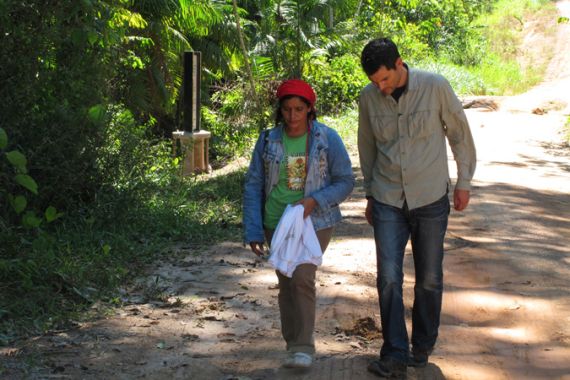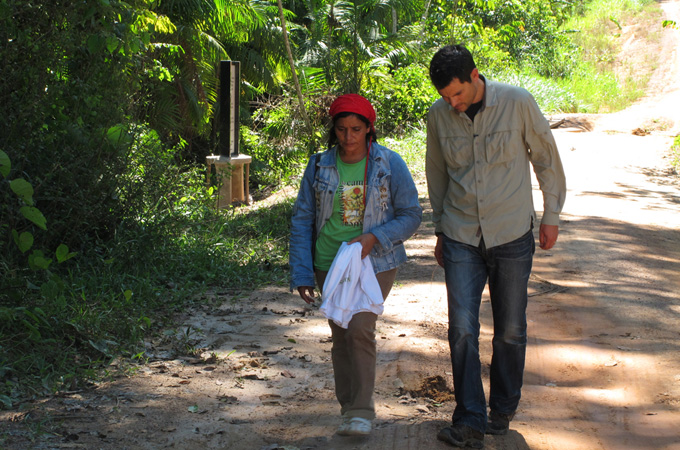
A tale of life, death and love
How two people were re-born through their common mission to protect the Amazon and preserve their piece of the jungle.
 |
| Gabriel Elizondo talks to the sister of murdered activist Maria do Espirito Santo |
Al Jazeera correspondent Gabriel Elizondo had never heard of Jose ‘Ze’ Claudio Ribeiro da Silva when news of his murder broke, but his was a story that would come to captivate him. Here he describes uncovering a tale that was as much about love as it was about death.
For me, it all started on Twitter. I remember seeing Twitter messages on my Blackberry, saying something in Portuguese to the effect of “Amazon activist” “murdered” and “Ze Claudio”, as I sat in my Sao Paulo office in late May.
Keep reading
list of 4 itemsRussian playwright and director go on trial over ‘justifying terrorism’
UK court to rule on Julian Assange extradition appeal: What could happen?
‘Grim reminder’: Sri Lanka’s Tamils mark 15 years since end of civil war
Jose ‘Ze’ Claudio Ribeiro da Silva was not a household name in Brazil at the time so I did not immediately recognise it. So I Googled him and one of the first things that came up was a video of his now famous speech at a TEDx environmental meeting where he predicted his own death. I was captivated and dropped everything else I was working on to make calls and do more research.
One of the first things that came to my mind was Dorothy Stang, the American-born nun murdered in the Brazilian Amazon in 2005 for her environmental activism. Stang’s case garnered worldwide attention, inspiring books and even movies. But what always troubled me was the sense that her murder was more widely covered by the international press because she was an American-born nun. Ninety-nine per cent of the activists facing death in the Amazon for standing up to loggers are Brazilian; they are usually poor and have no international exposure through which to call attention to their struggles.
Within a few hours of confirming the killing of Ze Claudio and his wife Maria do Espirito Santo, myself, Maria Elena Romero, a videographer and editor, and Tatiana Polastri, a producer, were on a plane to Maraba to cover the funeral.
A lot of things struck me about the funeral, but a couple really stood out. When I arrived at the house where the funeral was, everything was quiet but for the sound of crying. I noticed how humble the people there were. They were working class, with calloused hands from years of hard work and dark skin as a result of working under the sun. They were proud as they paid their last respects to the couple who, through their work to preserve the Amazon through sustainable development, had become leaders of their community and an inspiration to others who shared their principles.
I have covered many funerals, but this one seemed different. There was more going on here. I could tell from the expressions on people’s faces that the loss would be hard to overcome.
The second thing that became clear was that a story I thought was going to be very much about life and death was really just as much about love – the unconditional love between two people who found each other late in life and who were in a sense re-born together with a common mission to protect the Amazon and to preserve their little piece of the jungle.
Ze Claudio got all the attention, largely because of his TEDx speech, but I discovered that Maria was just as much of a driving force in their common struggle. She was studying at the local university in Maraba, working towards her degree and helping to train a younger generation of working class activists on how to live from the jungle in a sustainable way.
A couple of weeks later I would find myself back in Maraba, working on a film about Ze Claudio and Maria: The Crying Forest. The purpose of the film is not to solve a crime or to fix the problems of deforestation in the Amazon. The Brazilian Amazon belongs to Brazil and its future will be decided inside Brazil, not by filmmakers or NGOs from foreign countries.
But the purpose of The Crying Forest was to look more closely at who Ze Claudio and Maria were, why they were killed and the big void their deaths have left. The problems in the Amazon are not so much about trees as about land and money: who has it and who does not.
The Amazon is a complex place. Much of the destruction there is legal and state-sponsored and fuelled by people in places like New York, London and Moscow who unwittingly eat beef from the Amazon or buy a kitchen table made with illegally cut Amazon wood. But other destruction in the Amazon is very much illegal. Those who oppose it – and dare to take pictures of it and report it to the authorities – like Ze Claudio and Maria, face grave risks.
If nothing else, my hope is that The Crying Forest offers a peek into the lives of Ze Claudio and Maria’s families – especially Ze’s sister Claudelice and Maria’s sister Laisa. It was an honour and privilege to be allowed into their homes. Journalism students are taught to never get too attached to the people they cover, in fear of clouding impartiality. In most cases, I agree. But in this instance, that all went out of the window. I am not afraid to admit that I like Claudelice and Laisa and, more importantly, deeply respect them.
On the last day of filming, Claudelice and Laisa told me: “Thank you for coming to tell the story of Ze Claudio and Maria.” I felt almost embarrassed accepting thanks. I did not do anything. They were the ones who deserved praise. I did not say it at the time, out of fear of getting emotional, but I will say it now: “Thank you for allowing me to be a part of telling this story.” Without the participation of Claudelice and Laisa the film could not have been made. End of discussion.
The story of Amazon destruction and those who are fighting against it does not end with the death of Ze Claudio and Maria. Hardly. As you read this, hundreds of rural environmental activists face death threats in Brazil. Yes, hundreds. But will Ze Claudio and Maria be the last people to stand up to powerful illegal economic interests in the Amazon and be killed for doing so? As I say at the end of the film, sadly, I think I know the answer to that question, but cannot bear to say it out loud.
Gabriel Elizondo, based in Sao Paulo, is an Al Jazeera correspondent. He has been with Al Jazeera since 2006, previously based in Washington D.C. Follow him on Twitter @elizondogabriel.